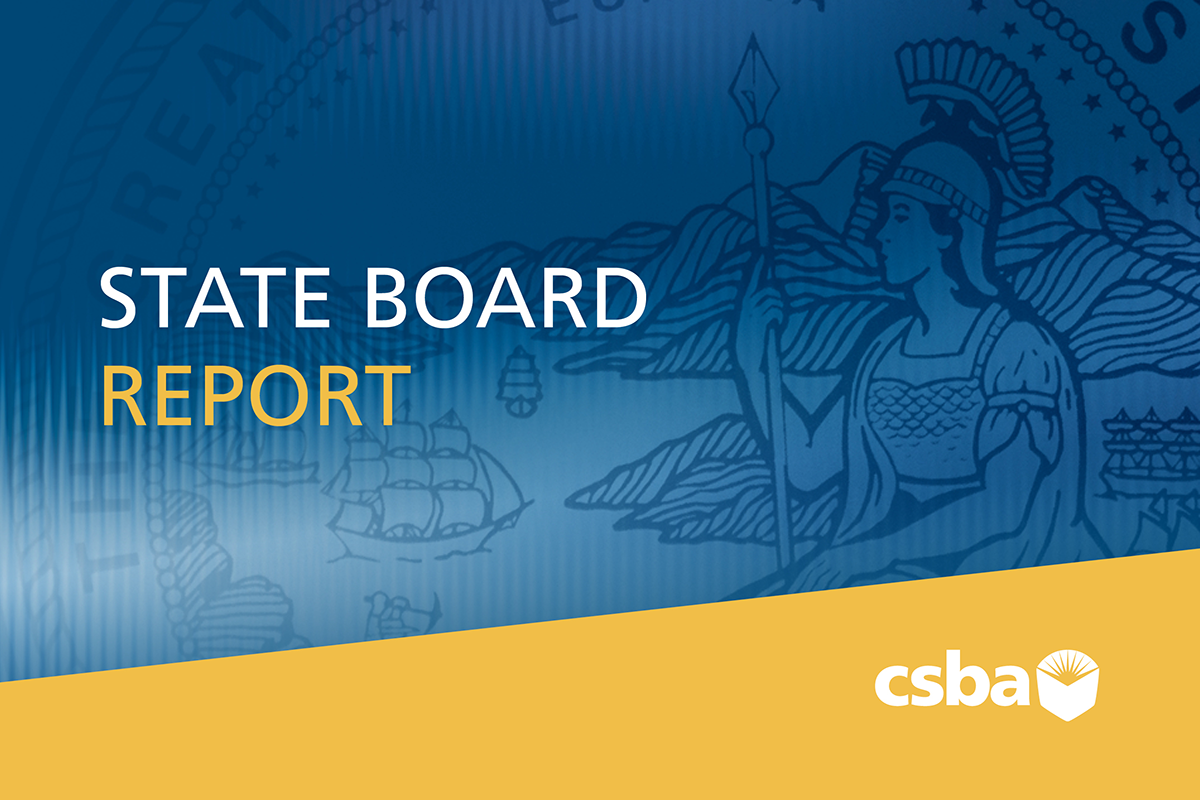Charter schools and career technical education were among the most discussed topics during the State Board of Education’s May 18–19 meeting.
Assembly Bill 1505 made substantial changes to processes governing charter school petitions and renewals and modified the level of review for requested renewal petitions based on California School Dashboard data, including a presumption for renewal for high-performing charters, presumption for non-renewal for low-performing charters, and a standard for those charters that fall in between. Specifically, California Education Code Section 47607.2 requires charter school authorizers to consider “verified data” for renewals of charter schools that fall within the low- and middle-performing categories.
The law defines verified data as “assessment data from nationally recognized, valid, peer-reviewed, and reliable sources that are externally produced.” It also includes postsecondary outcomes, which is defined as “college enrollment, persistence, and completion rates equal to similar peers.”
The board adopted updated criteria to define verified data, related data use procedures, and academic progress indicators for inclusion within the approved verified data list. Full descriptions are available in attachment one of the agenda item.
Among the updates:
- To be eligible for inclusion as verified data, a data source must include the results of at least 95 percent of eligible students. California Department of Education staff added that consistent with the U.S. Department of Education’s flexibility for state accountability purposes in 2019–20 and 2020–21, the 95 percent participation rate requirement should not apply in those years.
- CDE also added that just as charter schools must affirm that assessments were administered as intended, consistent with the test’s publishers’ administration and test security procedures, this must include any special administration guidance related to the COVID-19 pandemic, if applicable for 2019–20 and 2020–21.
- Charter schools may present evidence of learning disruptions due to the COVID-19 pandemic and/or natural disasters that resulted in school closures.
CSBA and other education organizations submitted a letter to SBE prior to the meeting in support of these proposed updates.
Following concerns brought up in public comment and by board member Sharon Olken, as well as discussion with CDE legal staff surrounding unclear wording in the law and how to reconcile it with real-world application, additional updates were proposed by Board President Linda Darling-Hammond.
These amendments, which were approved by the board, state that:
- As it relates to the 95 percent participation rate, “an authorizer may consider evidence of the impacts of global pandemic or natural disasters on participation and may waive this requirement if there is evidence that selection bias has not occurred (e.g. the school has not excluded students who are likely to score lower, on average, than students who took the assessment).”
- The data must include all student groups that have at least 11 students (using the groups and minimum size for reporting from the Dashboard) — the board clarified that this was applicable “for assessments that report student data for those groups.”
- Charter schools shall present data for the student groups whose California Assessment of Student Performance and Progress (CAASPP) performance placed the school in the middle or low performance category “when appropriate data for those student groups is available,” the board noted. The amendment included the following language, “Appropriate data will meet the minimum n size for the student group and wherever possible, be considered in terms of student group norms.”
- Finally, CAASPP data, and methodologies for analyzing it that are mutually agreed upon by the chartering authority and charter school, may be used to supplement Dashboard results. The board included an example of CAASPP data — “(e.g. CORE Student Growth Percentiles)” — to the updated language.
California State Plan for CTE
The board received updates on status of the California State Plan for Career Technical Education, which has been developed to encompass all CTE programs — federal and state funded — across the state to offer program and pathway guidance on a regional basis that supports local market needs.
CTE allows students to explore possible careers and develop both soft and job-specific skills needed to meet the demands of the labor market. Research suggests CTE, especially in combination with dual enrollment programs, is associated with higher graduation rates and lifetime earnings.
The State Plan for CTE seeks to improve equity in access and outcomes across California by providing cohesion and direction to current state, regional and local level efforts.
Moving forward, the goal is to develop a process that builds awareness of the plan among stakeholders and pave the way for successful implementation, according to CDE staff. Key elements of the regional implementation strategy include creating resources and tools to support implementation; facilitating a series of regional town halls to introduce leaders across the state to the plan; coordinating a statewide virtual convening; and developing state and regional implementation plans. The state-level plan focuses on steps that state leaders can take to support regional implementation and ensure its sustainability over the long term, while the regional-level plan is designed to be adaptable to specific local contexts and guide teams of cross-sector pathways partners.
Additional next steps include holding regional implementation convenings from late-August through September for local educational agencies and community colleges that have submitted a letter of interest in bringing a cross-sector team to participate. The convenings will help support regional teams in implementation planning to strengthen and build on current efforts and align programs and funding streams across sectors and institutions.
In other State Board meeting news:
- The board approved the second cohort of California Community Schools Partnership Program implementation grantees.
- Following significant discussion during the board’s January meeting related to developments and updates to the CAASPP, also known as Smarter Balanced assessments, and the English Language Proficiency Assessments for California (ELPAC), the SBE approved 2022–23 apportionment rates and updates on program activities.
- The board approved use of Summative Alternate ELPAC Overall Performance Level 3, Fluent English Proficient, to satisfy the English language proficiency criterion for reclassification decision-making beginning with the 2022–23 Summative Alternate ELPAC administration for English learners with the most significant cognitive disabilities.
The next State Board meeting is scheduled for July 12–13, 2023. View the full meeting calendar.



